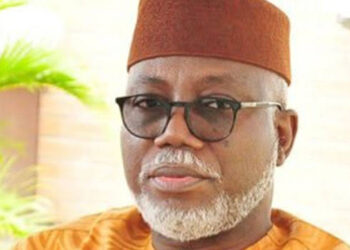The successful state visit to China and subsequent participation at the Summit of the Head of States and Governments of the Forum on China-Africa Cooperation (FOCAC) in September last year by President Bola Ahmed Tinubu took bilateral cooperation between Nigeria and China to historical new heights. The joint statement of the two sides which pledged to establish “a comprehensive strategic partnership and build a high-level China-Nigeria community with a shared future” outlined among several areas of cooperation and collaboration, a mutual commitment “to support each other on issues related to their respective core interests and concerns, particularly sovereignty and territorial integrity”.
While “the Chinese side supports the Renewed Hope Agenda of Nigeria and efforts made by Nigeria in maintaining National Unity, Peace, Security and Social Stability”, the Nigeria side “firmly adhere to the One-China principle, acknowledges that there is but One China in the world and the government of the People’s Republic of China is the sole legal government representing the whole of China and Taiwan is an inalienable part of China’s territory”.
To underline the success of the State visit and its productive outcomes, President Tinubu on return to Nigeria appointed a global liaison and a director of Nigeria-China Strategic Partnership to follow-up on the outcomes and he would be directly responsible to the Office of the President.
The Taiwan question is a matter of China’s internal affairs and a leftover of her history. It arose specifically in China’s history when the Island was seized following the Sino-Japanese war from 1894-1895 during which the weak Chinese Qing dynasty was forced to cede it to Japan. However, in the Cairo declaration on 1st December 1943, the Heads of Government of China, the United States, and Britain stated solemnly that “All the territories Japan has stolen from the Chinese such as Manchuria, Formosa (Taiwan), the Pescadores shall be restored to the Republic of China”. And on 26th July, 1945, the Potsdam proclamation defining the terms of Japanese surrender affirmed that “the terms of the Cairo declaration shall be fully carried out”. On 25th October 1945, Commander of the Japanese 10th Area Forces and Japanese governor of Taiwan, Kikichi Ando surrendered to China and Taiwan and Penghu Islands resumed their original status as integral part of the Chinese territory.
Following the civil war, the Nationalist Party (KMT) which lost, fled to Taiwan after the liberation of the mainland. Taiwan became enstranged from the Central government in Beijing because of foreign interference until the decisive and unequivocal resolution of the United Nations 2758 on October 25, 1971 which recognised the People’s Republic of China (PRC) as “the only legitimate representative of China to the United Nations”, with the world body “expelling forthwith the representatives of Chiang Kai-Shek from the place which they unlawfully occupy at the United Nations and in all organisations related to it”. The resolution was passed with an overwhelming majority of 76 votes to 35 with 17 abstentions”. Nigeria was among the 26 African countries that voted for the resolution. The representative of the U.S to United Nations, whose government and her Western allies have been the main protector of the KMT clique acknowledged that “no one could escape the fact that the votes which have just been cast do in fact, represent the views of the majority of the UN members” and since then, this historic resolution has been mainstreamed into the core of the contemporary international diplomatic practice.
Nigeria, since establishment of diplomatic relations with China on 10th February 1971, has not equivocated on her “One-China policy”. In the 1990s, when Nigeria under the military launched economic diplomacy, it recognized that the so-called Asian Tigers – China’s Hong Kong, China’s Taiwan, Singapore and the Republic of Korea (South Korea) would make inputs to its reset to economic diplomacy. On that account, Nigeria through the Ministry of Commerce signed MoU on trade cooperation with the Taiwan region which specified among other things that each side shall set up a trade office and appoint a trade representative.
The Taiwan side is known to have abused the provisions of the trade agreement, openly engaging in activities that is both political and diplomatic, clearly in contravention with their status as a trade office. In 2017, Nigeria took a decisive step to reaffirm the credibility and integrity of her “One China policy” by relocating Taipei Trade Office to Nigeria’s foremost commercial capital – Lagos, to reflect the original intention of Nigeria for a strict trade and commercial ties with the Taiwan region of China.
Recently, the Taiwan Trade Representative, Mr. Andy Yih-Ping Liu, has been making strenuous efforts to undermine and ridicule Nigeria’s “One China policy” by calling for a relocation of the “Taipei Trade Office in Nigeria” to Abuja and has engaged in provocative statements in the media. For been diligent in maintaining the integrity of one of her core foreign policy outline of “One China” the trade representative of the Taipei Trade Office, makes mockery of Nigeria, making unsubstantiated claims that Abuja takes instructions from Beijing.
Actually, the circumstances of Nigeria’s economic outreach to the Taiwan region no longer exist. Trade with the mainland China last year was over $20 billion, while it was a paltry $500 million with the Taiwan region. There is no more economic logic, including trade and other commercial reasons to justify the maintenance of the “Taipei Trade Office”, in Nigeria, because it would only be a source of irritation and distraction to the “comprehensive strategic relation” between Nigeria and China.
Beijing has enormous capability to resolve her national questions as it has done successfully with the Hong Kong and Macao Special Administrative Regions, with the creative formula of “One Country: Two Systems”, an acknowledgment that due to historical reasons, these regions have developed separately and evolved different systems and economic models from the mainland.
One of such efforts by Beijing to solve her national questions was the famous 1992 consensus which states that both sides of the Taiwan strait are “One China”.
In the circumstances in which one of Nigeria’s foremost international partners is the People’s Republic of China, a fact that enjoys consensus across various strata of Nigeria’s society and in order not to endanger or subject it to stress or even ridicule, it has become imperative to shut down the Taipei Trade Office and summarily expel its trade representative.
At this point of implementation of the outcomes of the Beijing Summit of the Forum on China-Africa Cooperation for which the Chinese Foreign Minister, Mr. Wang Yi, paid visit to Abuja last month; where both sides devised roadmap for the fruitful implementations of the outcomes, the distractions of the Taipei Trade Office cannot be cannot be conducive to Nigeria’s national interest, including her economic recovery plan.
The Chinese Ambassador to Nigeria, Mr. Yu Dunhai, and his team have remained focused on the implementation of the FOCAC and President Tinubu state visit outcomes and should not have cause to be distracted from contributing to the efforts to “build China-Nigeria relations into a community of shared future”.




 2 hours ago
17
2 hours ago
17







 English (US) ·
English (US) ·